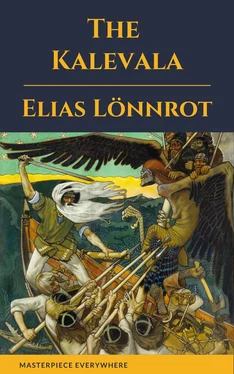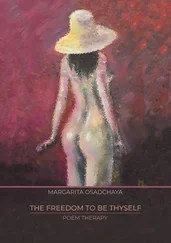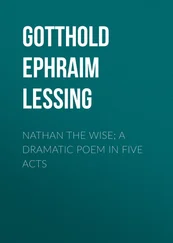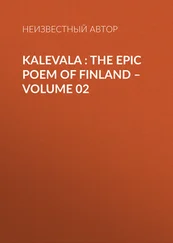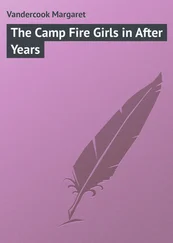So he hastened to the bath-house,
Found therein a group of maidens,
Working each upon a birch-broom.
Sat the hare upon the threshold,
And the maidens thus addressed him:
"Hie e there, Long-legs, or we'll roast thee,
Hie there, Big-eye, or we'll stew thee,
Roast thee for our lady's breakfast,
Stew thee for our master's dinner,
Make of thee a meal for Aino,
And her brother, Youkahainen!
Better therefore thou shouldst gallop
To thy burrow in the mountains,
Than be roasted for our dinners."
Then the haughty hare made answer,
Chanting thus the fate of Aino:
"Think ye not I journey hither,
To be roasted in the skillet,
To be stewed in yonder kettle
Let fell Lempo fill thy tables!
I have come with evil tidings,
Come to tell the cruel story
Of the flight and death of Aino,
Sister dear of Youkahainen.
With the stone of many colors
Sank poor Aino to the bottom
Of the deep and boundless waters,
Like a pretty song-bird perished;
Hung her ribbons on the aspen,
Left her gold-cross on the sea-shore,
Silken robes upon the alders,
On the rocks her silken stockings,
On the grass her shoes of deer-skin,
In the sand her shining necklace,
In the sand her rings and jewels;
In the waves, the lovely Aino,
Sleeping on the very bottom
Of the deep and boundless blue-sea,
In the caverns of the salmon,
There to be the whiting's sister
And the friend of nimble fishes."
Sadly weeps the ancient mother
From her blue-eyes bitter tear-drops,
As in sad and wailing measures,
Broken-hearted thus she answers:
"Listen, all ye mothers, listen,
Learn from me a tale of wisdom:
Never urge unwilling daughters
From the dwellings of their fathers,
To the bridegrooms that they love not,
Not as I, inhuman mother,
Drove away my lovely Aino,
Fairest daughter of the Northland."
Sadly weeps the gray-haired mother,
And the tears that fall are bitter,
Flowing down her wrinkled visage,
Till they trickle on her bosom;
Then across her heaving bosom,
Till they reach her garment's border;
Then adown her silken stockings,
Till they touch her shoes of deer-skin;
Then beneath her shoes of deer-skin,
Flowing on and flowing ever,
Part to earth as its possession,
Part to water as its portion.
As the tear-drops fall and mingle,
Form they streamlets three in number,
And their source, the mother's eyelids,
Streamlets formed from pearly tear-drops,
Flowing on like little rivers,
And each streamlet larger growing,
Soon becomes a rushing torrent
In each rushing, roaring torrent
There a cataract is foaming,
Foaming in the silver sunlight;
From the cataract's commotion
Rise three pillared rocks in grandeur;
From each rock, upon the summit,
Grow three hillocks clothed in verdure;
From each hillock, speckled birches,
Three in number, struggle skyward;
On the summit of each birch-tree
Sits a golden cuckoo calling,
And the three sing, all in concord:
"Love! O Love! the first one calleth;
Sings the second, Suitor! Suitor!
And the third one calls and echoes,
"Consolation! Consolation!"
He that "Love! O Love!" is calling,
Calls three moons and calls unceasing,
For the love-rejecting maiden
Sleeping in the deep sea-castles.
He that "Suitor! Suitor!" singeth,
Sings six moons and sings unceasing
For the suitor that forever
Sings and sues without a hearing.
He that sadly sings and echoes,
"Consolation! Consolation!"
Sings unceasing all his life long
For the broken-hearted mother
That must mourn and weep forever.
When the lone and wretched mother
Heard the sacred cuckoo singing,
Spake she thus, and sorely weeping:
"When I hear the cuckoo calling,
Then my heart is filled with sorrow;
Tears unlock my heavy eyelids,
Flow adown my, furrowed visage,
Tears as large as silver sea pearls;
Older grow my wearied elbows,
Weaker ply my aged fingers,
Wearily, in all its members,
Does my body shake in palsy,
When I hear the cuckoo singing,
Hear the sacred cuckoo calling."
Rune V. Wainamoinen's Lamentation.
FAR and wide the tidings travelled,
Far away men heard the story
Of the flight and death of Aino,
Sister dear of Youkahainen,
Fairest daughter of creation.
Wainamoinen, brave and truthful,
Straightway fell to bitter weeping,
Wept at morning, wept at evening,
Sleepless, wept the dreary night long,
That his Aino had departed,
That the maiden thus had vanished,
Thus had sunk upon the bottom
Of the blue-sea, deep and boundless.
Filled with grief, the ancient singer,
Wainamoinen of the Northland,
Heavy-hearted, sorely weeping,
Hastened to the restless waters,
This the suitor's prayer and question:
"Tell, Untamo, tell me, dreamer,
Tell me, Indolence, thy visions,
Where the water-gods may linger,
Where may rest Wellamo's maidens?"
Then Untamo, thus made answer,
Lazily he told his dreamings:
"Over there, the mermaid-dwellings,
Yonder live Wellamo's maidens,
On the headland robed in verdure,
On the forest-covered island,
In the deep, pellucid waters,
On the purple-colored sea-shore;
Yonder is the home or sea-maids,
There the maidens of Wellamo,
Live there in their sea-side chambers,
Rest within their water-caverns,
On the rocks of rainbow colors,
On the juttings of the sea-cliffs."
Straightway hastens Wainamoinen
To a boat-house on the sea-shore,
Looks with care upon the fish-hooks,
And the lines he well considers;
Lines, and hooks, and poles, arid fish-nets,
Places in a boat of copper,
Then begins he swiftly rowing
To the forest-covered island,
To the point enrobed In verdure,
To the purple-colored headland,
Where the sea-nymphs live and linger.
Hardly does he reach the island
Ere the minstrel starts to angle;
Far away he throws his fish-hook,
Trolls it quickly through the waters,
Turning on a copper swivel
Dangling from a silver fish-line,
Golden is the hook he uses.
Now he tries his silken fish-net,
Angles long, and angles longer,
Angles one day, then a second,
In the morning, in the evening,
Angles at the hour of noontide,
Many days and nights he angles,
Till at last, one sunny morning,
Strikes a fish of magic powers,
Plays like salmon on his fish-line,
Lashing waves across the waters,
Till at length the fish exhausted
Falls a victim to the angler,
Safely landed in the bottom
Of the hero's boat of copper.
Wainamoinen, proudly viewing,
Speaks these words in wonder guessing:
"This the fairest of all sea-fish,
Never have I seen its equal,
Smoother surely than the salmon,
Brighter-spotted than the trout is,
Grayer than the pike of Suomi,
Has less fins than any female,
Not the fins of any male fish,
Not the stripes of sea-born maidens,
Not the belt of any mermaid,
Not the ears of any song-bird,
Somewhat like our Northland salmon
From the blue-sea's deepest caverns."
In his belt the ancient hero
Wore a knife insheathed with silver;
From its case he drew the fish-knife,
Thus to carve the fish in pieces,
Dress the nameless fish for roasting,
Читать дальше
